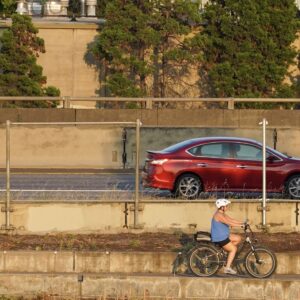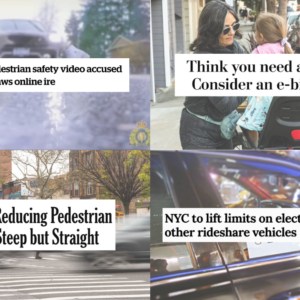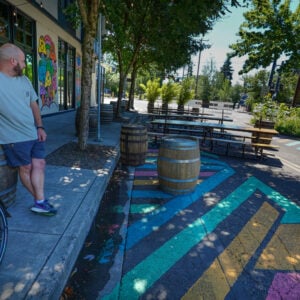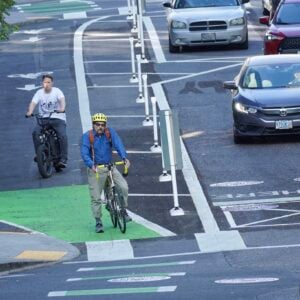
a few hours ago.
(Photo © J. Maus)
Max J. Kuney, of Kuney Construction, flew into Portland today to help save the Sauvie Island Bridge span.
Sensing that the project was on life-support after yesterday’s setback at City Council, Kuney paid his own way to fly to City Hall from his Spokane headquarters to meet with Commissioners and PDOT staffers working on the project.
Kuney is the owner of the Sauvie span and his company is on contract with Multnomah County on the project to replace it.
I spoke with Kuney at City Hall a few minutes ago and he said he didn’t want PDOT and City Council to think he was rushing them into a decision.
“We’re not trying to stampede them into making a decision on this. I asked Sam [Commissioner Adams] if me being here to explain the situation would help, and he said, ‘sure’, come on down.”
Kuney added, “I’m here to talk about the realities of our schedule and to answer questions about the bridge.”
Kuney has already made it clear that he would love to see the old Sauvie Island Bridge span — which his company owns — get re-used in downtown Portland. But he must remove the bridge (it is currently still in place connecting Hightway 30 to Sauvie Island) by June. This timeframe is what led Commissioner Adams to have to put forth an emergency declaration yesterday which would have allowed PDOT to work with Kuney to move the project forward.
That emergency declaration would have taken effect immediately, but it also required at least four of five Council votes and the unanimous support of everyone present. Adams expected Mayor Potter (who he knew would vote “no”) to miss the vote, but Potter surprised everyone by showing up — thus guaranteeing the measure would fail.
Commissioner Dan Saltzman also voted no, based on a technicality about the the nature of PDOT’s contract with Kuney.
As of 3:00pm today, Kuney is in Commissioner Adams’ office and Adams has just finished a meeting with Commissioner Saltzman to try and come to an agreement that all parties feel comfortable with.
Kuney says getting involved with a project like this is not his usual practice. “Usually, we come into a project after all the funding is lined up, then we bid on it and carry out the job. This situation is unique from a process standpoint.”
As a fourth-generation bridge builder (his great-grandpa founded the company in 1930), Kuney is clearly here for more than just another job.
“We have to take the bridge somewhere in June,” he said, “and we’d rather put it where you guys can actually use it.”
Stay tuned…the final chapter in the story of the Sauvie Island Bridge span is yet to be written. (Let’s hope for a happy ending.)







Thanks for reading.
BikePortland has served this community with independent community journalism since 2005. We rely on subscriptions from readers like you to survive. Your financial support is vital in keeping this valuable resource alive and well.
Please subscribe today to strengthen and expand our work.
That\’s what it\’s all about – get the parties involved to all sit down at the table and talk about the sticking points. I hope this works out in a positive way for all involved.
I\’m glad to see that people are beginning to realize that this is far, far, far more than just the argument of style over substance.
It\’s about planning a bridge that is iconic, and it\’s about sustainability, and it\’s about building a bridge that will accomodate not only todays\’ walking & biking needs, but those of the future.
But more importantly, it\’s about sending a strong message to everybody who sees the bridge, whether from the street, or from the freeway, that Portland is a sustainable city that promotes bicycling and walking, and that Portland is a city that practices what it preaches.
It\’s also about planning for the future.
wow, he even paid his own way! kuney our savior flew down from his heavenly post in spokane to play the part of the deus ex machina in the sauvie island bridge dramedy.
of course he wants to move the bridge and re-use it and get the contract, according to him it is only worth 30-35K in scrap.
re-using this bridge seems to be recycling for the sake of it. it\’s the engineering equivalent of art made out of old bike parts – just because you can doesn\’t mean you should.
A message to Mr. Kuney: I think it\’s a beautiful bridge, but the $$$ needs to work out as well. Can you make a case based on longevity or other tangibles that the bean counters can go to the bank with, so to speak?
Johnathan:
Just wanted to jump in to say that the driving factor with the timing of the contract was Kuney\’s demolition schedule.
PDOT had planned to have the contract before council on March 26th, but due to a posting/notification requirement of the Bureau of Purchases on sole source contracts, we were delayed a week.
Cheers.
pushkin (#3) – true, though in the case of a piece of art made out of bike parts, some malicious person can steal it or break it. A bridge on the other hand, is a large symbol visible for blocks that represents reutilizing old stuff rather than building something completely new, and all the waste that that implies.
The issue isn\’t so much whether we build a newer or cheaper bridge (the issue for me, anyway), but that we look around during these large projects and seeing what we can do with what is otherwise waste. Portland exemplifies the \”anti-disposable\” mindset, and I think this project is the iconic form of recycling.
I hope they do something valuable with the old Sauvie Island bridge also. They can\’t reuse it, but it would be great if they melted down the steel and recast it into beams used in a building in Portland or some such. We live on a finite world, and while not everything can be used in this way, one or two big visible projects like this one make a great and lasting statement.
Curious, The superstructure is only worth
30-35k as scrap. Is that what the city would pay for the bridge \”as is\” before any other costs are added such as paint removal, storage, transport and such?
Wouldn\’t a \”sustainable\” option be to use Johnson street a mere 4 blocks down the street?
To the various penny-pinchers: be sure you compare apples to oranges.
Saying this option will cost an extra million or two versus a regular ped bridge is penny wise and pound foolish. A regular ped bridge would be a 15\’ eye-sore like we have in North Portland over I-5. A full size bridge such as the Sauvie Island bridge is so different in kind it is like comparing a Cadillac to a Pinto. In actuality, re-using the Sauvie bridge is a tremendous bargain. You could not build a new bridge comparable to the old one for anything remotely near the cost of re-using the old one.
For a quick comparison, I don\’t know how much the new Sauvie bridge ultimately cost, but in 2001 it was estimated at $34 million. As we know from the tram project, steel costs have sky rocketed in the last few years. So, it\’s $34 million is easily the minimum. Anyone proposing to reuse the old bridge for $5.5 million should be heralded for their thriftiness, not derisively challenged to show how the numbers work. Sheesh.
So to be short and snarky about it, Sam Adams has found us a screaming deal on a used Mercedes and Tom Potter is complaining that it is costing us $10k more than a new Subaru.
Here\’s the ridiculous part: Potter has an axe to grind with Adams. Whatever, that\’s politics. But certain folks like useful idiots are buying into the crazy Tom is selling. Puh-leeze get a clue.
How much did Potter\’s \”Visioning\” project cost? What do we as \”concerned tax payers\” have to show for that!?!
I like the Subaru/Mercedes analogy as it\’s very apt. The sustainability of completing this project in a landmark way versus later in a unattractive sub-optimal way comes down to ridership. When the city develops bike boulevard grade links all around the city, those less than hardcore bikers then, if history is any indicator, will increasingly take to the streets.
For me, I represent different riders at different times. This schizophrenia depends upon whether I\’m with my kids or not. Solo, I\’m on NE to W Broadway, Everett, whatever. With the kids, it needs to be quiet, green and safe. Not only that, it\’s got to be *nice*. The kids should see the best of PDX like the esplanade.
The bridge facilitates NW destinations for the riders who need or want a safe and pleasant route.
Max J. Kuney, I\’m going to nominate you for an Alice Award. You\’re my hero.
I\’m very glad that Kuney came to Portland to explain his company\’s end of the project in greater detail. Knowing more about such things as the viability of the bridge in terms of longevity (a point Jason Penny #4, raised) is important, as well as maintenance costs compared to that of a concrete bridge.
As Stripes points out, planning for the future is also a very important consideration in terms of what the larger capacity Sauvie Island Bridge can offer Portland.
Patrtick #8, points out that Johnson Street, 4 blocks down does allow passage under the obstacle, I-405 that the Flanders ped/bike bridge is planned to address. Does the Johnson St route adequately meet the travel needs of pedestrians and cyclists? Apparently many people don\’t think so.
I was walking in the Pearl tonight, and checked out Everett, Flanders, and Glisan at 12th street. Everett and Glisan: both one-way, both very fast. Flanders: two-way, much slower motor vehicle traffic. At 12th looking west, there\’s quite a sturdy little hill as Flanders rises to meet I-405. A lot of cyclists are going to heading up that rather slowly. When they do get to whatever bridge will be placed there, extra width would work out very nicely in terms of allowing faster riders to move ahead of slower riders.
Lets see that artists rendition again…this time to scale & chain link debris shields.
It\’s an albatross if placed there.
Designed to span 2x that distance, would need raising to meet min 405 clearance where a smaller crossing could be arched, scaled and be made far more elegant.
might as well give it pontoons and float it across to newly donated Ross Island.
Or as a Temporary Sellwood.
Even Kuney would agree as a bridge builder.
In response to Patrick #8. Four blocks may not seem like much to a cyclist, however, for a pedestrian, that\’s nearly half a mile—a full ten minutes of walking.
It would be fantastic if the bridge could be re-used as freeway overcrossing!
Thoughts and questions arise after reading Steve #8\’s points:
This bridge was engineered for a particular span and footprint. After considering plans and elevations of the site, would it fit well?
It would be great to hear Kuney\’s analysis of the proposal…
With a retrofit, would scale and proportion be appropriate?
Could reasonable cost \”aesthetic\” design possibilities arise for the debris shielding? (Chain link- yuk.)
Have plans or renderings been created/shown at the hearings, and to public, to reflect not just project\’s feasibility & a demo of Portland \”green-ish\” sensibility, but show visually & tangibly that it can become an attractive and useful community asset?
And like a Used Mercedes vs a New Subaru, the cost of upkeep will also be greater.
You\’re buying a used item that will require more inspections to ensure the structure is still viable. This is an old bridge, does it meet current earth quake specifications? Not sure I want is spanning a freeway if it doesn\’t.
What about paint. A concrete structure won\’t require painting, while the old bridge will require painting as maintenance to maintain it\’s viability.
Yup, while the used Mercedes has panache it is a money pit over a new more efficient Subaru.
Great analogy!!!
Regardless of how this works out in the end, I am truly impressed with Kuney\’s willingness to be part of a solution. Kudos.
Re #16
I was sitting next to Jonathan Maus at city hall. They showed some engineering work, and at that particular location it fits like a glove. Amazing luck.
Re #17
The central span is in great shape its the concrete approaches to it that are nearly ruined. It doesn\’t take nearly as much to maintain a steel bridge as it does a concrete one from what I hear. They tend to replace concrete bridges rather than fix them. The Sauvie island steel span is plenty strong enough for heavy vehicles like fire trucks fully loaded with water. In fact they said that once in place it would be the only bridge across I405 that meets current requirements.
One thing no one has mentioned is that by the time the supposedly \”less expensive\” new concrete bridge option is built in 5 or more years, it will probably cost as much or more than this proposal due to inflation of construction costs. Of course, the money allocated for the project will not have increased, so where\’s the advantage in waiting? We\’ll end up spending just as much and getting something smaller and less distinctive, and we\’ll have to wait longer to use it.
Of course Kuney is all for re-using the bridge – its a guaranteed $7.5 million in their pocket and they can promote how \”green\” they are.
\”…where a smaller crossing could be arched, scaled and be made far more elegant.\” Steven J
Really? For 5.5 mil? Let us see the design proposal you\’re dreaming of for that amount of money. I\’ll be very surprised if the planned concrete span has any elegance whatsoever. Prove us wrong Steve. Since the city is in the process of making this decision between the two bridge options, we should be looking at what the proposed concrete bridge might look like.
What do you think you know about the Sauvie having to be raised to meet I-405 clearance? How much? Please be specific.
And what makes you so certain that chain link will be used for, as you say \”…debris shields…\”? I imagine you\’re actually referring to anti-vandal screens designed to keep morons from throwing stuff off overpasses onto cars below. Even the Salmon Street overpass has a more attractive box wire screen to address this issue.
Where BabyGorilla got the \”…guaranteed $7.5 million…\” figure, is hard to say. News has been reporting a $5.5 million dollar figure for use of the Sauvie, with an allowed $1.3 million add-on for possible additional costs. That adds up to $6.8 million.
And #14 Steven J, when you say the bridge was designed to span twice the distance, you\’re including the aging concrete approaches as well. The central span looks to be just short of 200 feet, while the width of a city block, and hence the width of 405, happens to be a nice, round 200 feet.
Like Daniel said, it fits like a glove—a reusable, pedestrian-friendly, steel glove.
\”am Adams has found us a screaming deal on a used Mercedes and Tom Potter is complaining that it is costing us $10k more than a new Subaru.\”
And a lot of us are wondering why we need another car in the first place. I\’m finding the metaphor a little ironic, given the audience. I\’ve ridden over the two existing bridges plenty of times, and it never once occurred to me they were so unusually dangerous as to need an expensive bypass.
John, My question was about the \”sustainable\” argument I keep hearing not the amount of time it would take a person on bike vs. foot.
http://www.obec.com/bridges/I-5_beltline_ped.html
2.5 million spanning 6 lanes of I-5 with a substantial median, and a bit of style. 2008 prices. Reuse is cool, but make sure your are frittering a money on a hunk o junk with no redeeming feature other than is older than you are.
(Sheesh, translating from Yoda speak)
http://www.obec.com/bridges/I-5_beltline_ped.html
2.5 million dollars spanning 6 lanes of I-5 with a substantial median, and the bridge has a bit of style. This is a 2008 price. Reuse is cooler than recycling, but make sure your are not frittering a bunch of money on a hunk o junk with no redeeming feature other than is older than you are.
\”Reuse is cooler than recycling, but make sure your are not frittering a bunch of money on a hunk o junk with no redeeming feature other than is older than you are.\” Coyote
Alright, you might be more helpful to that end by offering the source of the information that says the Beltline Pedestrian-Bike Bridge in Eugene will be built for 2.5 million (it\’s not built yet).
I like a lot of the pedestrian-bike bridges on OBEC\’s website. If any of those can be adapted to the Flanders location for 2.5 million, I\’d say that would be a better choice than the Sauvie Island there for 5.5 to 6.8 million.
(I have dial-up, so it\’s not practical for me to download some of those PDF\’s and look for the budget outlays specifying the cost of OBEC\’s or the Beltline bridge.)
Leave the Sauvie Island bridge where it is as a bike/pedestrian link to the island. Build a parking lot on the Highway 30 side of the channel. This would take pressure off the island\’s congestion.
wsbob (#28)
http://www.kval.com/news/17173786.html
It\’s half-built already, and construction is slated to be complete this October. It\’ll be interesting to see if there are cost overruns, and if so, how much.
Matt, thanks! The article didn\’t have a lot of specific details about the bike/pedestrian bridge; width, but it looks good. I\’m suspicious about the 2.5 mil figure though. I\’d still favor the Sauvie Island Bridge span at Flanders if something like the Eugene beltway bridge or others on OBEC\’s website couldn\’t be built for the projected 4 mil for Flanders with a concrete span. I wonder what kind of answer Adams could produce in that regard.
Use the bridge, let Kuney make some $ here. It\’ll keep some money from being wasted to expand car capacity!
I\’m suspicious about the $2.5 mil also – especially here in Portland. The Eugene land is flat on both sides, identical rock composition under both foundations, not on an earthquake fault line, and not near buried streams – not all of those are the case at the I-405 site.
$5 million in funds are already lined up for this, and much of that money can only go for a bridge – it can\’t be diverted to other bike projects.
Yeah, Matt, it\’s was interesting that in all the hoopla accompanying last weeks blow-up over the emergency decision on the Sauvie Island bridge, renderings or prices for the planned concrete pedestrian bridge weren\’t either presented or suggested (assuming preliminary designs hadn\’t yet been prepared).
People can seem to get very excited about these kinds of things, even when important, tangible ideas aren\’t readily available to consider. The O\’s conservative point man, David Reinhard, did that very thing today in his spotlight column in the Sunday paper. He dumped on the Sauvie Island Bridge option for Flanders, seeming without having a clue about what kind of pedestrian bridge, beyond the lower price, was planned in terms of specs and aesthetics for the location instead.
I\’m wondering if there are some preliminary drawings of the planned Flanders pedestrian/bike bridge already prepared. Maybe those people over at skyscraper page know.